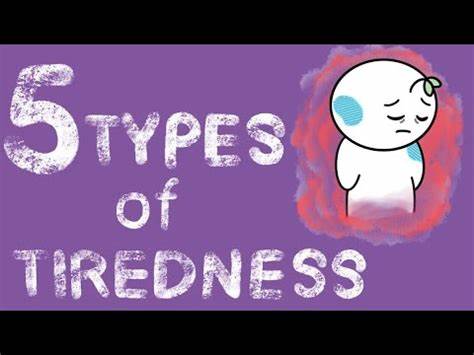
The 5 Types of Tiredness
(bright music) – [Narrator] Hey, Psych2Goers, and welcome back to our channel. Thank you all so much
for the love and support that you’ve given us. Your ongoing support has
helped us make psychology and mental health more
accessible to everyone. Now, let’s continue. Have you ever heard of the phrase, I need to recharge my batteries? While this phrase isn’t
meant to be taken literally, it’s just another way of saying that you need time to sit back, relax, and tend to your personal needs.Do you often overwork yourself and push yourself past your
limits unintentionally? If so, it’s important to be wary of the consequences it can bring. Tiredness is like a cry for
help from our body and mind that’s trying to tell us
there’s something wrong. This is why it’s important not to neglect or immediately disregard our feelings when first trying to understand them. In this video, we’ll help
you identify the five types of tiredness you may experience. Number one is social tiredness. Have you ever felt drained or overwhelmed as a result of too much socialization, whether it’s in person or online? You could be dealing
with social tiredness, also known as social fatigue.This might especially ring a bell if you’re a more introverted person, but this doesn’t mean extroverts can’t experience social exhaustion either. Social fatigue doesn’t necessarily happen when you’re around people you don’t like. Even after enjoying a long
day with friends and family or going to dinner with
your significant other, you can still feel worn out
and in need of some alone time. Two, physical tiredness. Physical exhaustion is what you might feel after playing a sport or even
after mustering up the energy to get out of bed in the morning. Because you feel it in your body, this makes physical tiredness
one of the most noticeable and identifiable of its kind, as well as one of the most common. This kind of weariness may also
be a result of a lack of sleep or a poor diet. When you’re physically tired, you feel sore and heavy, and your tiredness will
show through yawns, dreary-looking eyes, or sluggish movement. Number three is emotional tiredness. As humans, we can feel emotions on various, complex levels. For instance, a child
dropping their ice cream on the sidewalk might not
trigger the same measure of emotions as an adult
who’s lost a loved one.Sadness, hopelessness
and fear are all emotions you’ll face throughout life’s obstacles but eventually learn to overcome. Are you dealing with an
overwhelming and stressful situation for a long period, such as an emotionally
abusive relationship or a toxic friendship? Prolonged stress can cause
emotional exhaustion to set in. Emotional tiredness can
affect your energy levels, as well as the stamina you rely on to check things off your to-do lists. Number four is mental tiredness. Do you ever have one of those days where your mind feels cloudy and you’re unable to concentrate? Mental tiredness affects
your thinking and behavior, including how you make decisions and your performance at work or school.Even your long-term and
short-term memory can be affected. Mental exhaustion is
caused by prolonged stress and working yourself past your limits. As a result, this brings about
certain behavior changes, such as social withdrawal or neglecting your responsibilities. And number five, burnout. Burnout is a combination
of physical, emotional, and mental exhaustion that
gradually builds up over time. Being in a state of
burnout can make you feel as if everything you do serves no purpose, causing you to question
the point of putting effort into work, school, or your
personal goals in the first place. Burnout makes it hard to see
and enjoy the good things in life because every day
feels like a bad day for you, and life’s constant demands
can put even more weight on your shoulders. Because it creeps up on you over time, it’s not easy to pinpoint
the start of your burnout, but you’ll know when you
feel the extreme level of overall exhaustion.Can you relate to any of
these five types of tiredness? If so, what do you plan to do about it? Let us know in the comments below. Staying in check with your
mental health and well-being is always a priority, and listening to your body and acknowledging any alarming
changes regarding yourself and your lifestyle is one way to do so. Please like and share this
video if it helped you and you think it could
help someone else, too. The studies and references are listed in the description below.Are you fatigued all the time? Are you feeling mentally exhausted, emotionally exhausted, or burnout all the time? Did you know that there are many types of fatigue? Staying in check with your mental health and well-being is always a priority, and listening to your body and acknowledging any alarming changes regarding yourself and your lifestyle is one way to do so. Knowing what exactly these red flags are is what Psych2Go is here to help you with, so with that being said, we’ve made this video to help you identify the 5 types of tiredness you might experience. If you can relate to this video but you’re not sure why you’re tired all the time, we have a video explaining that as well:  • Why You Feel Tired All The Time Don’t forget to hit the subscribe button and notification bell icon
for more Psych2Go videos. Thank you for watching, and
we’ll see you next time…ᵛᶦᵈᵗᵒᵒⁿ™ ².¹ ᴏɴᴇ ᴛɪᴍᴇ ᴏꜰꜰᴇʀ – ᴛʜᴇ 2ᴅ ᴀᴍɪɴᴀᴛɪᴏɴ ᴠɪᴅᴇᴏ ᴍᴀᴋᴇʀ After The Massive Success Of VidToon™ 1.0
And More Than 10ᴋ Happy Customers…WE ARE BACK ON Popular Demand! Redefine Profitability With The World’s Easiest & Most Popular Video Animation Software It’s ʙɪɢɢᴇʀ. ʙᴇᴛᴛᴇʀ. ᴀɴᴅ ꜰᴀꜱᴛᴇʀ.
• Why You Feel Tired All The Time Don’t forget to hit the subscribe button and notification bell icon
for more Psych2Go videos. Thank you for watching, and
we’ll see you next time…ᵛᶦᵈᵗᵒᵒⁿ™ ².¹ ᴏɴᴇ ᴛɪᴍᴇ ᴏꜰꜰᴇʀ – ᴛʜᴇ 2ᴅ ᴀᴍɪɴᴀᴛɪᴏɴ ᴠɪᴅᴇᴏ ᴍᴀᴋᴇʀ After The Massive Success Of VidToon™ 1.0
And More Than 10ᴋ Happy Customers…WE ARE BACK ON Popular Demand! Redefine Profitability With The World’s Easiest & Most Popular Video Animation Software It’s ʙɪɢɢᴇʀ. ʙᴇᴛᴛᴇʀ. ᴀɴᴅ ꜰᴀꜱᴛᴇʀ.


 A high, prolonged cortisol level can mess with a lot of stuff. It’s even been seen to decrease the volume of your hippocampus, the area responsible
for learning and memory, and a reduced hippocampus
is more often seen in people with depression than those without. So all this is to say that the extra stress is probably not doing your brain or your body any favors. And humans are historically
bad at making decisions when they don’t know
what’s going to happen? So, what can you do to
reduce the allostatic load? Reduce stress. Eating well, exercising, and maintaining a regular sleep schedule cannot be overlooked. Exercising alone can
reduce stress hormones, even with just a 20-minute walk. And a different way of
thinking could also help us: an idea called model-free learning. It’s trial and error. Instead of basing your risk assessment on similar examples from the past or envisioning future scenarios, you just take it one step at a time. This way, you reassess and
update your estimate of what’s happening and how to prepare. We’re dealing with a new virus, constantly changing policies, and likely a completely different schedule and maybe even environment. Our brain is on high alert at all times to identify potential threats. This means that even if you’re spending most of your time laying around, your brain isn’t, so try not to beat yourself up for feeling tired or fuzzy, or unmotivated. You just don’t need anything
else to stress about. Now that you know all of this, how are you feeling? Alex: To be honest, I
do still feel the same. Fran: I think I’m feeling a
bit better after watching it. Victoria: It’s
my body is exhausted from feeling things and being under stress all day, all the time. Graham: Whenever I feel
that allostatic load starting to weigh down on me, you know, I can put a
name on it, a face on it, and it makes it a lot
easier to deal with it.
A high, prolonged cortisol level can mess with a lot of stuff. It’s even been seen to decrease the volume of your hippocampus, the area responsible
for learning and memory, and a reduced hippocampus
is more often seen in people with depression than those without. So all this is to say that the extra stress is probably not doing your brain or your body any favors. And humans are historically
bad at making decisions when they don’t know
what’s going to happen? So, what can you do to
reduce the allostatic load? Reduce stress. Eating well, exercising, and maintaining a regular sleep schedule cannot be overlooked. Exercising alone can
reduce stress hormones, even with just a 20-minute walk. And a different way of
thinking could also help us: an idea called model-free learning. It’s trial and error. Instead of basing your risk assessment on similar examples from the past or envisioning future scenarios, you just take it one step at a time. This way, you reassess and
update your estimate of what’s happening and how to prepare. We’re dealing with a new virus, constantly changing policies, and likely a completely different schedule and maybe even environment. Our brain is on high alert at all times to identify potential threats. This means that even if you’re spending most of your time laying around, your brain isn’t, so try not to beat yourself up for feeling tired or fuzzy, or unmotivated. You just don’t need anything
else to stress about. Now that you know all of this, how are you feeling? Alex: To be honest, I
do still feel the same. Fran: I think I’m feeling a
bit better after watching it. Victoria: It’s
my body is exhausted from feeling things and being under stress all day, all the time. Graham: Whenever I feel
that allostatic load starting to weigh down on me, you know, I can put a
name on it, a face on it, and it makes it a lot
easier to deal with it.